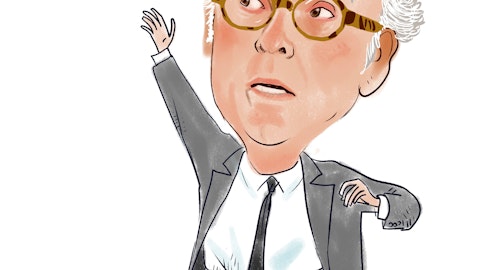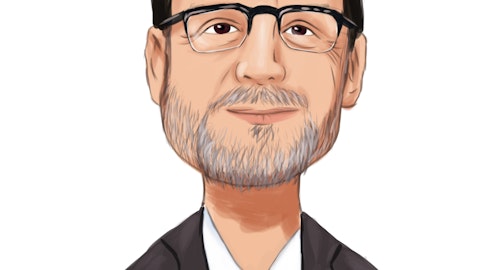Tim Coffey: Tani, I appreciate the color you provided on deposit and potential outflows, and I think that you put you’re spot on. I’m wondering though, where do you think noninterest-bearing deposits as a percentage of total deposits could end at the end of this year?
Tani Girton: So again, that’s another tough question. When we had the Great Recession, we — our noninterest bearing kind of went up from an average of, say, 35% to 40%, 42%. And toward the end of the cycle there, we had every expectation that, that percentage would go down. And it never did, it did nothing but climb. So I’m not going to predict that it’s going to go up any further. And I’m not going to say that it can’t go down. But I think historically, that is just — that’s a big, big focus for us, and it’s something that we will work hard to maintain. And yes, it can go down from 50%. But I think that given our business model, that’s something that we pay attention to all the time.
Tim Coffey: Right. Okay. And I apologize if I missed it earlier, but were there any costs associated with the branch closures in 4Q?
Tani Girton: Yes. We had some small amount of accelerated costs. So what happens is we have some tenant improvements and lease expense that gets accelerated over the remaining time that we occupy those properties. And so a small piece of that happened in December. Most of it will happen in 2023, but as you saw, the net impact of that and the savings for the year ends up being positive.
Tim Myers: And that cost is really the differential between the costs we set for 2023 and the annualized run rate going forward. We’re retaining all the employees. We’re just going to reposition them into the nearby branches and other places. So there’s no employment-related costs there. It’s almost entirely what Tani mentioned.
Tim Coffey: Okay. All right. I appreciate that. And then, Tim, can you provide some color on this general customer sentiment in the current rate environment? I mean, clearly, you’re still able to open for business and booking loans but I’m wondering what’s the soon it like? Is there a bit of hesitancy to make investments right now?
Tim Myers: I think hesitancy to the word. I think for a few months there a couple of months at least, it was — it was a bit of silence, right? The rates continue to increase and a lot of doom and gloom news out there are certainly uncertainty around what the news is going to be. But as I mentioned, we’re really starting to see the pipeline build back up. And so people do grow accustomed to higher rates. They are not abnormally higher long-term rates than we’ve seen historically, but they’re certainly different than they were most recently. So I think there’s an adjustment period. And — but we are seeing that activity increase. And — that just means we have to work harder to generate that activity, but we are committed to doing that.
Tim Coffey: Great, okay. Well, great. Those were my questions. Thank you very much.
Tim Myers: Thanks.
Tani Girton: We did have a couple of — go ahead, operator.
Operator: Certainly. We have actually one more question on the phone. It’s another follow-up from Andrew Terrell with Stephens. Go right ahead.
Andrew Terrell: Hi Tim, hi Tani, thanks for the follow-up question.
Tim Myers: Sure.
Andrew Terrell: Tim, I just wanted to — it seems like focus kind of at the company right now is maybe more internally focus. I just wanted to get maybe an update from you on M&A if that was of interest to you at all or how conversations were going in the market right now?
Tim Myers: Sure. Well, as I’m sure you’ve heard it, it’s slow from what I can tell in the market out there. We always remain open to those opportunities. I’m out there talking to other banks and investment bankers as are many of my competitors. And as you know, they’re sold, not bought. So you have to wait for someone to raise their hand. But no, we remain open to the opportunity, remains a key part of our strategic plan, but I can’t force that activity and then most importantly, finding the right partner when that does and activity increases.
Andrew Terrell: Understood. Thanks for questions.
Tim Myers: You’re welcome.





